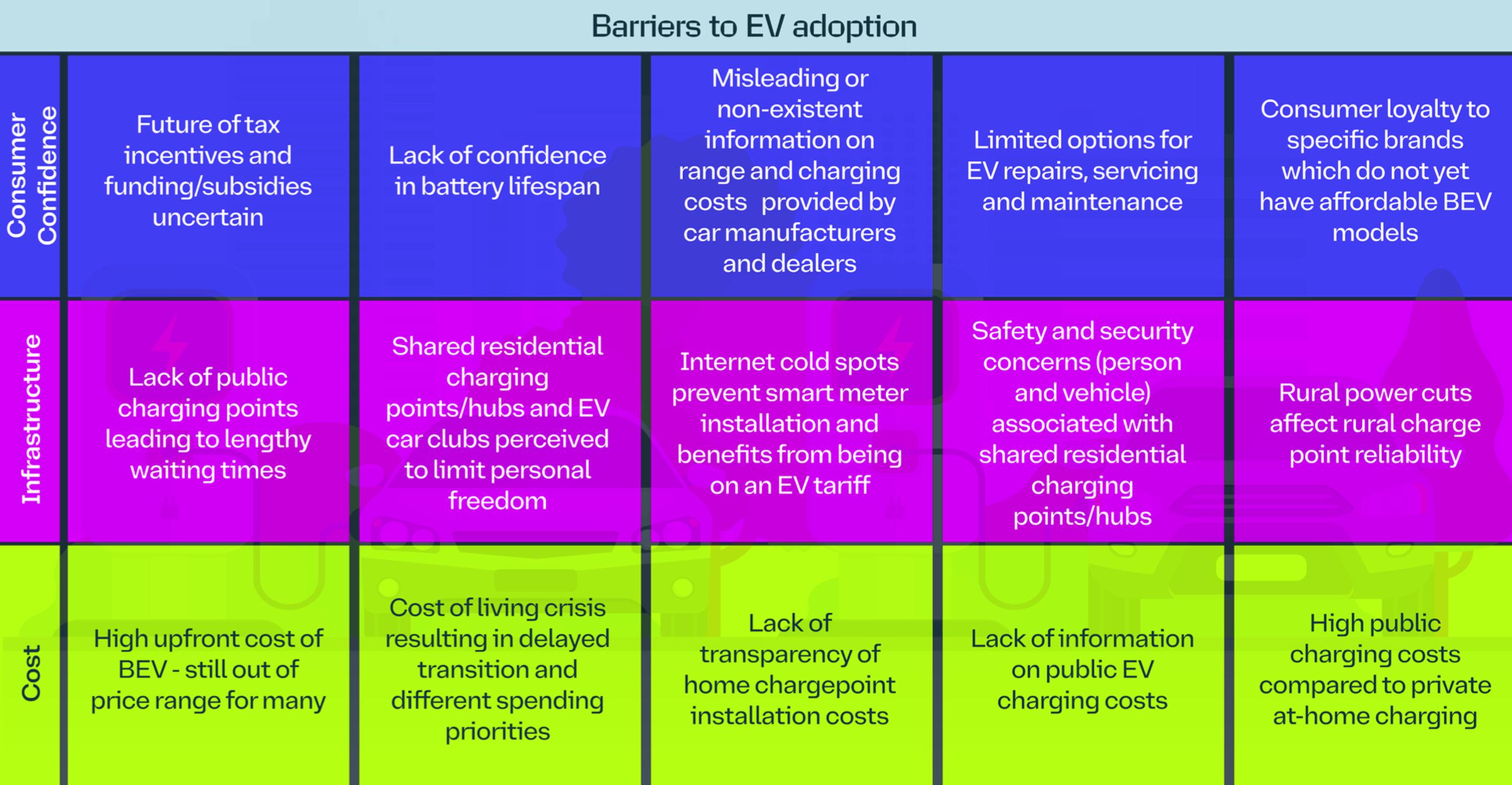

There’s no doubt that the electrification of road transport is accelerating. Electric vehicle (EV) sales are increasing, the variety of electric models is expanding, and the UK Government has plans to decarbonise the transport system.
However, despite an increasingly favourable landscape and significant Government investment in charging infrastructure over the last year, barriers to EV adoption remain.
There are 900,000 battery electric cars and 49,882 public chargepoints in the UK today. As a part of the electric vehicle infrastructure strategy announced in 2022, the Government unveiled its plan for a near-tenfold increase in public charge points to 300,000 by 2030.
National deployment at this rate will require more collaboration from all stakeholders involved in the EV transition, not just the transportation or energy sectors. Collaboration amongst stakeholders will be critical in guiding EVs into the mainstream.
AtkinsRéalis conducted consumer research into EV adoption in collaboration with Transport for the North. We surveyed 204 car and van drivers in the North of England, and found that 92% of respondents owned one or more petrol or diesel vehicles, while 13% already drive a hybrid, plug-in hybrid electric vehicle (PHEV) or electric vehicle.
The elements that permitted or impeded the adoption of an EV were then investigated in two focus groups.
When asked to describe the problems they faced while considering changing to an EV, participants articulated a broad range of linked factors, which collectively led to reluctance or perceived difficulty in moving to an EV.
While the affordability of an EV in light of the cost-of-living crisis was on the minds of most participants, a range of equally important issues were also identified, highlighting a series of interrelated and reinforcing barriers that collectively prove too complex for many drivers to navigate.
The cost of purchasing/leasing and charging an EV was a significant concern for individuals contemplating switching, particularly in the context of the cost-of-living crisis and higher energy prices, according to our research.
The upfront cost of hybrids, PHEVs and EVs was still considered too high for most people’s budgets, with several current hybrid, PHEV users waiting for prices to fall before switching to an EV. For some, the cost-of-living crisis has also delayed a switch as they refocus priorities on other expenses, such as rising mortgage payments.
There were also concerns among older people in our focus groups about their ability to obtain financing to purchase an EV:
A lack of information on cost was also a key deterrent when considering the transition to an EV. This included: ambiguity around the price of installing a charge point at home; obtaining ambiguous (or no) information about charging costs from car manufacturers and dealerships; and a lack of clarity about the cost of charging at public charging points.
There also appears to be a large information gap on incentives and subsidies to encourage EV adoption, with uncertainty regarding tax benefits and a lack of understanding regarding potential funding or grants available to install domestic chargepoints.
The availability and accessibility of EV charging infrastructure were also high priorities for those considering it. For some respondents, the typical range of an EV and the availability of public charging points were too limited to provide enough confidence to make the switch to an EV. Hybrids and PHEVs were seen as giving a level of freedom that EVs currently do not.
Residents of rural areas expressed concern about the scarcity of public chargepoints. They also stated that they face localised issues such as power outages and inadequate digital connectivity, which may jeopardise the stability of at-home charging and their ability to use a smart meter and hence benefit from discounted electricity pricing.
The opportunity to have private charging facilities at home was an important and desirable enabler for many respondents, including those living in urban and rural areas, to move to a PHEV or EV. Meanwhile, there was only limited enthusiasm for shared residential charging solutions (such as kerbside charging points or neighbourhood charging hubs) or even a shared ownership model (such as EV car clubs).
Some respondents expressed scepticism about battery performance across the life cycle of an EV, believing that batteries degrade rapidly with use and that a used vehicle would not be able to attain the range of a brand-new equivalent.
Other market-related barriers were also found, such as consumer preference/loyalty to specific vehicle brands that do not currently provide low or mid-priced EV models and a lack of consumer choice regarding EV servicing, maintenance, and repairs.
This research has revealed how consumers perceive the existence of a multitude of micro-barriers, many of them interdependent, that frequently stack up on top of each other to form an insurmountable ‘wall’. Many consumers will remain unable to successfully scale the ‘wall’ until the barriers that are relevant to their specific circumstances are unlocked.
You can read the full whitepaper here: Understanding consumer barriers to the electric vehicle transition
Francesca Barrick and Matt Smith are senior consultants at AtkinsRéalis

TransportXtra is part of Landor LINKS
© 2026 TransportXtra | Landor LINKS Ltd | All Rights Reserved
Subscriptions, Magazines & Online Access Enquires
[Frequently Asked Questions]
Email: subs.ltt@landor.co.uk | Tel: +44 (0) 20 7091 7959
Shop & Accounts Enquires
Email: accounts@landor.co.uk | Tel: +44 (0) 20 7091 7855
Advertising Sales & Recruitment Enquires
Email: daniel@landor.co.uk | Tel: +44 (0) 20 7091 7861
Events & Conference Enquires
Email: conferences@landor.co.uk | Tel: +44 (0) 20 7091 7865
Press Releases & Editorial Enquires
Email: info@transportxtra.com | Tel: +44 (0) 20 7091 7875
Privacy Policy | Terms and Conditions | Advertise
Web design london by Brainiac Media 2020